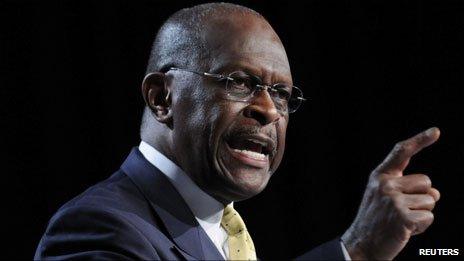Herman Cain: Could he go the distance?
- Published

Herman Cain has stormed to the front of the pack of Republican presidential candidates. So what is the appeal of the former pizza company boss and will this surge of popularity last?
Judging by the attention paid to him by primetime television comedians this week, Herman Cain is the man of the moment.
David Letterman and Jon Stewart both poked fun at the former chief executive of Godfather's Pizza, thereby confirming his arrival upon the American cultural landscape.
It's been a heady few days for the straight-talking businessman, who held his own in Tuesday's televised debate with his Republican rivals in New Hampshire. He sat centre stage, next to the frontrunner Mitt Romney, but got twice as many laughs.
A poll the following day by NBC and the Wall Street Journal , externalsuggested Mr Cain had surged to the very front of the field among Republican presidential primary voters, putting him ahead of Mr Romney by 27% to 23%, and continuing a surge of support other polls had indicated, external in the last week.
He's not the first Republican candidate to attract a section of the party that seems reluctant to support Mr Romney. Donald Trump, Michele Bachmann and Rick Perry have all burned brightly in the role of "perfect torch-bearers", as one commentator put it, only to fade.
But Mr Cain, 65, shares little else with those rivals, and the differences go some way to explain why his sudden rise has raised eyebrows.
He's a man with no electoral experience and a CV which includes Baptist minister, mathematician, a director of the Federal Reserve Bank and radio talk show host.
The Cain campaign has no great financial backing and he has spent more time promoting his book than doing the hard graft in the key early primary states.
"It's definitively Herman Cain's moment and nothing short of astonishing that he's beating Mitt Romney in at least one poll," says John Avlon, author and columnist.
"He's the best communicator in the bunch by far, probably the best orator in the Republican party in recent times.
"He's also long been a favourite of the Tea Party and the evangelical community, so he's the ultimate validator of the Republican conservative movement."
The surge could last, says Mr Avlon, but the experience of Mr Trump, Mrs Bachmann and Mr Perry - whose stumble has mirrored Mr Cain's surge - suggests it's unlikely.
But he is a fresh face, he adds, which means he can escape the Republican anger directed at Washington.
That he is now reaching for the White House at all caps a wonderful personal story. Born in Tennessee to a janitor and a cleaner, his parents' hard work enabled him to go to college to study for a maths degree and a master's in computing.
In his 30s he was running hundreds of Burger King stores in the Philadelphia area and then took over the reins at Godfather's Pizza, reversing its fortunes and earning himself a place on the board of directors at the Federal Reserve Bank of Kansas City.
For many years, he hosted a radio talk show in Atlanta, an experience that political blogger and radio show host Bill Press believes has helped him in recent weeks.
"His talk show host experience has been extraordinarily valuable because you have to learn to get to the essence of things fast, to say things in a provocative way, and in that sense he's a very effective communicator. He's good for the soundbite."
"Nine, nine, nine," has been the constant refrain from Mr Cain in every TV interview, hammering home his tax policy that would reduce federal income tax and corporate tax code to 9% but - most controversially - introduce a 9% national sales tax that many from within and without his own party have ridiculed.
He's a clown and his 999 slogan is a joke, says Mr Press, because it would be political suicide to increase taxes on the middle class. "It says something about the electorate that they would be so easily guiled."
His straight-talking is part of his appeal, but some of his statements have drawn sharp criticism, particularly his comments in the past about Muslims, external. He has also implied that the unemployed only have themselves to blame, external.
He is most comfortable talking about jobs. And a glance at his website, external underlines his central message - that his success in business equips him to solve the country's severe economic problems.
Cain is a strong candidate who's bright, articulate and likeable, says polling expert Steve Mitchell, but while his lack of experience works in his favour because he has no record to attack, this could be viewed as a weakness when people cast their votes.
He will need to get an organisation in place, because Mitt Romney has a formidable one, and things don't happen without a strategy, says Mr Mitchell.
"A poll can prop you up and a good debate can prop you up, but when it comes to a campaign, it's dicey how well he can mobilise funds."
The instability in the polls suggests Republican voters are still under-whelmed by the choices on offer, and it could all change, says Shaun Bowler, a political scientist at University of California Riverside.
"The polls are picking up something - Cain comes across as folksy and straight talking which has an appeal.
"But I think the current polls shouldn't be taken as a set-in-concrete guide to how the actual electorate will vote in several months time."